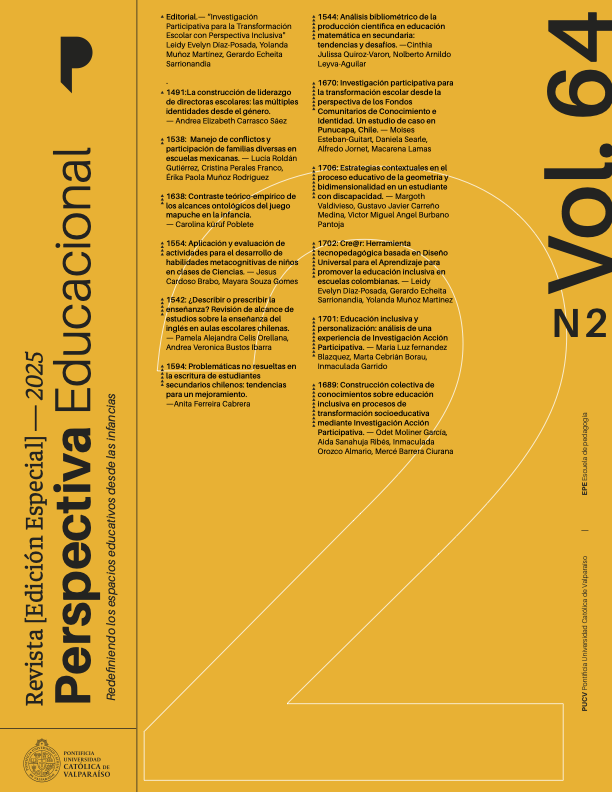Inclusive Education and Personalization: An Analysis of a Participatory Action Research Experience
DOI:
https://doi.org/10.4151/07189729-Vol.64-Iss.2-Art.1701Keywords:
Inclusive education technopedagogical tool Universal Design for Learning Design-Based Research participatory researchAbstract
This article presents a Participatory Action Research (PAR) experience carried out by a group of 17 individuals—16 teachers from eight educational centers across various Spanish regions and one university researcher—aimed at improving teaching personalization processes. The research is structured around two main objectives: (1) to systematize the research process undertaken and (2) to analyze PAR as a methodological tool, identifying learnings, challenges, and strengths that emerged throughout the process.
The need that sparked this initiative stemmed from a shared desire to “make learner-centered teaching a reality, from a holistic view of the person.” Although personalization is recognized in Spain’s current education law (LOMLOE, 2020), its effective implementation requires practical tools, reflective teaching practices, and supportive organizational conditions. Thus, the group identified the development of a self-assessment guide as a key need to support teachers in reflecting on and improving their practices from an inclusive perspective.
The PAR process was structured into three phases: research, education, and action. In the research phase, participatory techniques such as the matrix of present and future scenarios and brainstorming were used to identify needs, concerns, and aspirations regarding personalization. During the education phase, the group deepened their understanding of key theoretical frameworks such as self-determination, quality of life, Universal Design for Learning, and person-centered planning. In the action phase, the group collaboratively developed the guide Gafas para reflexionar y mejorar la personalización de la enseñanza (“Glasses to Reflect and Improve Teaching Personalization”), structured into two dimensions: an individual one focused on teaching practice, and an institutional one addressing school-wide conditions.
The analysis of the process revealed significant insights. One key learning was the importance of distinguishing between personalization and inclusive education. While personalization is a powerful tool to address diversity, inclusive education requires broader systemic transformation. The process also highlighted the cultural impact of personalization, fostering greater involvement of students, families, and teachers, and emphasizing the teacher’s role as a facilitator of learning. Additionally, the need to rethink school organization to sustain change was underscored.
Challenges identified included transforming teaching methodologies, clarifying professional development models, reorganizing time and space, and securing institutional support. PAR was valued as a powerful methodology for generating situated knowledge, empowering educational communities, and promoting meaningful change from within.
In conclusion, this experience demonstrates that it is possible to move toward more inclusive education through participatory processes that empower professionals and bridge theory and practice. The research not only produced a practical tool for schools but also fostered an inter-school support network committed to educational improvement. This work invites us to rethink not only what we research, but how and why we do it—placing educational communities at the heart of transformation.
References
Ainscow, M. (2020). Inclusion and equity in education: Making sense of global challenges. Prospects, 49(2), 123-134. https://doi.org/10.1007/s11125-020-09506-w
Ainscow, M., Booth, T., & Dyson, A. (2006). Improving Schools, Developing Inclusion. Routledge. https://doi.org/10.4324/9780203967157
Ainscow, M., Dyson, A., Goldrick, S., & West, M. (2013). Promoviendo la equidad en educación. Revista de investigación en educación, 11(3), 44-56. https://bit.ly/3LtuOFe
Amor, A., Hagiwara, M., Shogren, K., Thompson, J., Verdugo, M. A., Burke, K., & Aguayo, V. (2018). International perspectives and trends in research on inclusive education: a systematic review, International Journal of Inclusive Education, 23(12), 1277-1295. https://doi.org/10.1080/13603116.2018.1445304
Ares, I. (2021). La investigación acción participativa como herramienta para la transformación inclusiva del espacio educativo de una escuela de educación primaria en Zaragoza. REIIT Revista Educación, Investigación, Innovación y Transferencia, (1), 1-30. https://doi.org/10.26754/ojs_reiit/eiit.202115445
Astudillo, L., Simón, C., & Fernández-Blázquez, M. L. M. (2025). Current Roles of Support Teachers, Analysis of Their Contribution to Inclusive School: A Narrative Review. Disabilities, 5(1), 23. https://doi.org/10.3390/disabilities5010023
Balcazar, E. (2003). Investigación acción participativa (IAP): Aspectos conceptuales y dificultades de implementación. Fundamentos en Humanidades, (7), 59-77.
Booth, T., & Ainscow, M. (2015). Guía para la educación inclusiva. Desarrollando el aprendizaje y la participación en los centros escolares (3.a ed.). Grafilia. https://doi.org/10.15366/reice2015.13.3.001
Braun, V., & Clarke, V. (2006). Using thematic analysis in psychology. Qualitative Research in Psychology, 3(2), 77-101. https://doi.org/10.1191/1478088706qp063oa
Braun, V., & Clarke, V. (2019). Reflecting on reflexive thematic analysis. Qualitative Research in Sport, Exercise and Health, 11(4), 589-597. https://doi.org/10.1080/2159676X.2019.1628806
Carratalá, A., Mata, G., & Crespo, S. (2017). Planificación centrada en la persona: planificando por adelantado el futuro deseado. Plena Inclusión España. https://lc.cx/WWCvfk
Center for Applied Special Technology. (2024). Universal Design for Learning guidelines (v. 3.0). CAST.
Centro Español de Documentación e Investigación sobre Discapacidad. (2023). Estudio sobre la transformación de las escuelas en espacios inclusivos y accesibles. Real Patronato sobre Discapacidad, Ministerio AS y Agenda 2030.
Coll, C. (2018). La personalización al servicio del aprendizaje escolar. Dossier 3. Graó.
Comité sobre los Derechos de las Personas con Discapacidad (2024, 22 de marzo). Informe del Comité. Seguimiento a la Investigación sobre España realizada por el comité en virtud del artículo 6 del Protocolo Facultativo de la Convención. https://www.sindromedown.org/storage/2024/04/20240322-CRPD_C_ESP_FUIR_1_9983_S.pdf
Creswell, J. W. (2013). Qualitative inquiry and research design. choosing among five approaches (3.ª ed.). Sage.
Denzin, N. K., & Lincoln, Y. S. (2012). Introducción general. La investigación cualitativa como disciplina y como práctica. En N. K. Denzin, & Y. S. Lincoln (Coords.), Manual de investigación cualitativa. El campo de la investigación cualitativa (vol. 1, pp. 43-102). Gedisa editorial.
Echeita, G., Barrios, A., Gutiérrez, H., & Simón, C. (2018). Aulas inclusivas en una escuela para tod@s y con tod@s. Educadores: Revista de renovación pedagógica, (266), 30-42.
Echeita, G., & Simón, C. (Coords.). (2019). El papel de los Centros de Educación Especial en el proceso hacia sistemas educativos más inclusivos. Cuatro estudios de casos: Newham (UK), New Brunswick (Canadá), Italia y Portugal. Ministerio de Educación y Formación Profesional de España.
Espinosa, E. R. (2022). Nuevos sentidos de la convivencia en la escuela: sistematización de una experiencia de Investigación Acción Participativa con docentes. Revista Latinoamericana Estudios de la Paz y el Conflicto, 3(5), 87-104. https://doi.org/10.5377/rlpc.v3i5.12649
Fals Borda, O. (2022). El problema de cómo investigar la realidad para transformarla por la praxis. En Espacio Abierto, 31(1), 193-221. Tercer Mundo.
Flick, U. (2015). Introducing research methodology: A beginner's guide to doing a research project. Sage.
Florian, L., & Beaton, M. (2018). Inclusive pedagogy in action: getting it right for every child. International Journal of Inclusive Education, 22(8), 870-884. https://doi.org/10.1080/13603116.2017.1412513
Freire, P. (2009). Pedagogía de la autonomía (11.a ed.). Siglo XXI.
Fullan, M. (2021). The right drivers for whole system success. Centre for Strategic Education.
Gobierno de España. (2020). Ley Orgánica 3/2020, de 29 de diciembre, por la que se modifica la Ley Orgánica 2/2006, de 3 de mayo, de Educación (LOMLOE), artículo 7. Boletín Oficial del Estado, núm. 340, de 30 de diciembre de 2020. https://www.boe.es/eli/es/lo/2020/12/29/3
Göransson, K., & Nilholm, C. (2014). Conceptual diversities and empirical shortcomings- a critical analysis of research on inclusive education. European Journal of Special Needs Education, 29(3), 265-280. https://doi.org/10.1080/08856257.2014.933545
Herrera, M. D. M., Matés, C., Farzaneh, D., & Barrado, S. (2021). Caminando hacia la Inclusión a través de la Investigación Acción Participativa en una Comunidad Educativa. Revista latinoamericana de educación inclusiva, 15(2), 135-153. https://doi.org/10.4067/S0718-73782021000200135
Korsgaard, M., Larsen, V., & Wiberg, M. (2018). Thinking and researching inclusive education without a banister-visiting, listening and tact as a foundation for collective research on inclusive education. International Journal of Inclusive Education, 24(5), 496-512. https://doi.org/10.1080/13603116.2018.1469680
Lambrecht, J., Lenkeit, J., Hartmann, A., Ehlert, A., Knigge, M., & Spörer, N. (2022). The effect of school leadership on implementing inclusive education: How transformational and instructional leadership practices affect individualised education planning. International Journal of Inclusive Education, 26(9), 943-957. https://doi.org/10.1080/13603116.2020.1752825
Lindner, K.-T., & Schwab, S. (2020). Differentiation and individualisation in inclusive education: A systematic review and narrative synthesis. International Journal of Inclusive Education, 1-21. https://doi.org/10.1080/13603116.2020.1813450
Martín, E., & Marchesi, A. (2014). Calidad de la enseñanza en tiempos de crisis. Alianza.
Messiou, K. (2017). Research in the field of inclusive education: time for a rethink? International Journal of Inclusive Education, 21(2), 146-159. https://doi.org/10.1080/13603116.2016.1223184
Messiou, K. (2019). The missing voices: students as a catalyst for promoting inclusive education. International Journal of Inclusive Education, 23(7-8), 768-781. https://doi.org/10.1080/13603116.2019.1623326
Miles, M., Huberman, M., & Saldaña, J. (2014). Qualitative data analysis. A methods Sourcebook (3.ª ed.). SAGE Publications.
Montañés, M. (2009). Metodología y técnica participativa. Teoría y práctica de una estrategia de investigación participativa. Editorial UOC.
Morin, E. (2004). La mente bien ordenada: repensar la reforma, reformar el pensamiento (6.ª ed.). Seix Barral.
Muñoz, Y., & Porter, G. L. (2020). Planning for all students: Promoting inclusive instruction. International Journal of Inclusive Education, 24(14), 1552-1567. https://doi.org/10.1080/13603116.2020.1813450
Nairaian, S., & Schlessinger, S. (2017). When theory meets the “reality of reality”: Reviewing the sufficiency of the social model of disability as a foundation for teacher preparation for inclusive education. Teacher Education Quarterly, 44(1), 81-100. https://www.jstor.org/stable/90003619?seq=1#page_scan_tab_contents1
Nilholm, C. (2020). Research about inclusive education in 2020 – How can we improve our theories in order to change practice? European Journal Of Special Needs Education, 36(3), 358-370. https://doi.org/10.1080/08856257.2020.1754547
Norwich, B. (2014). Changing policy and legislation and its effects on inclusive and special education: a perspective from England. British Journal of Special Education, 41(4), 403-425. https://doi.org/10.1111/1467-8578.12079
Organización de las Naciones Unidas para la Educación, la Ciencia y la Cultura. (2020). Towards inclusion in education: status, trends and challenges: the UNESCO Salamanca Statement 25 years on. UNESCO. https://unesdoc.unesco.org/ark:/48223/pf0000374246
Parrilla, A., Susinos, T., Gallego-Vega, C., & Martínez, B. (2017). Revisando críticamente cómo investigamos en educación inclusiva: cuatro proyectos con un enfoque educativo y social. Revista interuniversitaria de formación del profesorado, 31(89), 145-156. https://dialnet.unirioja.es/servlet/articulo?codigo=6129226
Roulston, K. J. (2007). Reflective interviewing: A guide to theory and practice. SAGE Publications.
Saldaña, J. (2016). The coding manual for qualitative researchers (3.a ed.). SAGE Publications.
Schlessinger, S. (2018). Reclaiming teacher intellectualism through and for inclusive education, International Journal of Inclusive Education, 22(3), 268-284. https://doi.org/10.1080/13603116.2017.1362598
Schön, D. (1992). La formación de los profesionales reflexivos. Paidós-MEC.
Simón, C., & Barrios, Á. (2019). Las familias en el corazón de la educación inclusiva. Aula Abierta, 48(1), 51-58. https://doi.org/10.17811/rifie.48.1.2019.51-58
Simón, C., Palomo, R., & Echeita, G. (2024). The duty to promote an inclusive educational system: A phenomenological study on the assessment procedures of pupils with special educational needs in Madrid (Spain). International Journal of Inclusive Education, 28(6), 803-819. https://doi.org/10.1080/13603116.2021.1968513
Slee, R. (2019). Belonging in an age of exclusion. International Journal of Inclusive Education, 23(9), 909-922. https://doi.org/10.1080/13603116.2019.1602366
Stake, R. (2013). Estudio de casos cualitativos. En N. K. Denzin, & Y. S. Lincoln (Coords.), Manual de investigación cualitativa. Las estrategias de investigación cualitativa (vol. 3, pp. 43-102). Gedisa editorial.
Susinos, T. (2017). La participación de los estudiantes: mucho más que un bazar de buenas intenciones. Organización y gestión educativa: Revista del Fórum Europeo de Administradores de la Educación, 25(6), 27-31.
Susinos, T., Ceballos, N., Sáiz, Á., & Allica, C. (2018). Cuando todos cuentan: experiencias de participación de estudiantes en las escuelas. Arco/Libros, La Muralla.
Uthus, M., & Qvortrup, A. (2024). Lessons learned from Norway: a values-based formulation of inclusive education. European Journal of Special Needs Education, 40(2), 244-258. https://doi.org/10.1080/08856257.2024.2354603
Van Mieghem, A., Verschueren, K., Petry, K., & Struyf, E. (2018). An analysis of research on inclusive education: A systematic search and meta-review. International Journal of Inclusive Education, 24(6), 675-689. https://doi.org/10.1080/13603116.2018.1482012
Verdugo, M. A., Gómez, L., Arias, B., Santamaría, M., Clavero, D., & Tamarit, J. (2013). Escala INICO-FEAPS: Evaluación Integral de la Calidad de Vida de personas con Discapacidad Intelectual o del Desarrollo. INICO. https://sid-inico.usal.es/documentacion/escala-inico- feaps-evaluacion-integral-de-la-calidad-de-vida-de-personas-con-discapacidad-intelectual-o-del-desarrollo/
Verdugo, M. A., Vicente, E., Gómez, M., Fernández, R., Wehmeyer, M., Badia, M., González, F., & Calvo, M. I. (2014). Escala ARC-INICO de Evaluación de la Autodeterminación Manual de aplicación y corrección. INICO. https://sid.usal.es/idocs/F8/FDO26898/herramientas_autodeterminacion.pdf
Downloads
Published
How to Cite
Issue
Section
Categories
License
Copyright (c) 2025 mluz fernandez blazquez, Marta Cebrián Borau, Inmaculada Garrido Jiménez

This work is licensed under a Creative Commons Attribution-ShareAlike 4.0 International License.
The authors grant an exclusive licence, without time limit, for the manuscript to be published in the Perspectiva Educacional journal, published by the Pontificia Universidad Católica of Valparaíso (Chile), through the School of Pedagogy.





